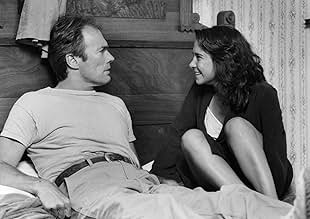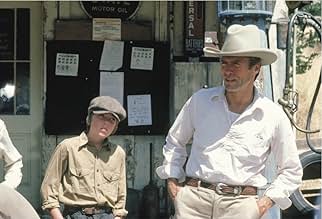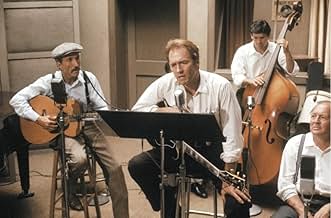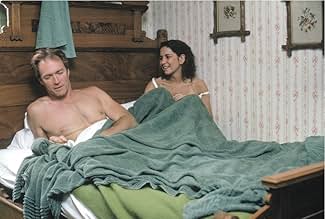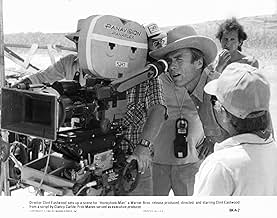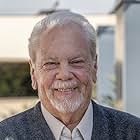VALUTAZIONE IMDb
6,6/10
9879
LA TUA VALUTAZIONE
Un ragazzo con un talento musicale parte per un viaggio con lo zio per un concerto sul palco.Un ragazzo con un talento musicale parte per un viaggio con lo zio per un concerto sul palco.Un ragazzo con un talento musicale parte per un viaggio con lo zio per un concerto sul palco.
- Premi
- 1 candidatura in totale
Recensioni in evidenza
Despite almost every critic I've read, I think this is a real gem by Clint Eastwood. A honest, sensitive effort in the road movie tradition. The minor tone, the naive sequences soothe Red Stovall's journey to his fate. The movie also displays a touching view of the depression era in USA. Like animated Roy Emerson Stryker's pictures the photography is remarkable as well as the sound track. I've learned about lots of singers and musicians that recorded only to give a final testimony of their art. I guess stories like these deserved a movie like Honkytonk Man. Long life to Clint, one of the most underrated talents not only in Hollywood but in the rest of the world.
One of Clint Eastwood's more personal projects is Honkytonk Man where he both gets to do some singing and also to work with his then adolescent son Kyle. Apparently Kyle Eastwood has inherited the musical part of the Eastwood genes because he makes his living now as a jazz musician. I wonder if he ever jams with Woody Allen?
Clint did not exactly set the world on fire in his previous musical outing in Paint Your Wagon. But in Honky Tonk Man he's right in his element as a hard living country singer during the Depression trying to finally catch a break with the Grand Ole Opry.
Arriving at his sister's farm, Clint picks up both Kyle who is playing his nephew here and John McIntire who is Kyle's grandfather on his father's side and the three generations start out from Oklahoma to Nashville.
Eastwood has played some hard bitten characters in his films, but never one as dissolute as Red Stovall. His high living has brought him a case of tuberculosis, a lot more common and a lot less curable back in those days. In any event the peace and quiet of a sanitarium holds no interest for Clint. He'd rather go out drinking and wenching than die of boredom in a sanitarium.
Of course the odyssey of the three bring any number of adventures about life and love in their lives.
John McIntire fits right in with the father and son Eastwoods. Also look for good performances by blues singer Linda Hopkins, young Alexa Kenan who hitches a ride with the travelers, and a cheating Barry Corbin who Clint collects from in the usual Eastwood manner. All and all a nice family project from the clan Eastwood.
Clint did not exactly set the world on fire in his previous musical outing in Paint Your Wagon. But in Honky Tonk Man he's right in his element as a hard living country singer during the Depression trying to finally catch a break with the Grand Ole Opry.
Arriving at his sister's farm, Clint picks up both Kyle who is playing his nephew here and John McIntire who is Kyle's grandfather on his father's side and the three generations start out from Oklahoma to Nashville.
Eastwood has played some hard bitten characters in his films, but never one as dissolute as Red Stovall. His high living has brought him a case of tuberculosis, a lot more common and a lot less curable back in those days. In any event the peace and quiet of a sanitarium holds no interest for Clint. He'd rather go out drinking and wenching than die of boredom in a sanitarium.
Of course the odyssey of the three bring any number of adventures about life and love in their lives.
John McIntire fits right in with the father and son Eastwoods. Also look for good performances by blues singer Linda Hopkins, young Alexa Kenan who hitches a ride with the travelers, and a cheating Barry Corbin who Clint collects from in the usual Eastwood manner. All and all a nice family project from the clan Eastwood.
Set in Depression era Oklahoma, this film tells the story of a dirt poor, alcoholic singer named Red Stovall (Clint Eastwood), who heads out for Nashville, in hopes of making it big as a country singer. The story begins on a dilapidated farm composed mostly of dust, where Red's sister hesitatingly allows her son Whit (Kyle Eastwood) to go with Red to Nashville. The kid's Grandpa (John McIntire) also wants to go, to return to his native Tennessee. The film's beginning is dreary and depressing, but wonderfully realistic of the dust bowl days of the 1930s.
Much of the plot takes place on the road, as the three travelers encounter an assortment of characters and problems along the way. The most important character they meet is a young girl named Marlene (the late Alexa Kenin), who yearns to be a country singer. It's one of many plot contrivances, but at least this contrivance offers some humor, especially when Marlene ... "sings". Other plot contrivances include a jailbreak, an angry bull, an aborted robbery, and an incident involving a chicken coop.
If the film's weakness is excess contrivances, the film's strength is the portrayal of Red as an interestingly complex character. He coughs a lot, a symptom of tuberculosis. And the TB is getting worse. The question is ... will Red be able to reach the promise land before the disease affects his ability to sing? And, in a long monologue aimed at Whit, Red talks about his long-ago love affair with Mary Sims.
The film's acting is credible, if not outstanding. Kyle Eastwood does a nice job as Whit. The film also features cameos by several then-current country singers. At the end, there's some sad real-life irony as Marty Robbins helps Red.
"Honkytonk Man" has some good atmosphere. Arguably, the best segment is at the Top Hat Club on Beale Street in Memphis, where the great Linda Hopkins belts out a blues number. If the film's writer had ditched some of those hokey "on the road" contrivances, and focused the plot more in smoky old bar rooms with low light levels and mournful music, the film would have been a lot better. As is, "Honkytonk Man" is still worth a look, if for no other reason than to see a low-key character study, in contrast to the brash and gaudy big ticket films of that cinematic era, like "Raiders Of The Lost Ark" and "Star Wars".
Much of the plot takes place on the road, as the three travelers encounter an assortment of characters and problems along the way. The most important character they meet is a young girl named Marlene (the late Alexa Kenin), who yearns to be a country singer. It's one of many plot contrivances, but at least this contrivance offers some humor, especially when Marlene ... "sings". Other plot contrivances include a jailbreak, an angry bull, an aborted robbery, and an incident involving a chicken coop.
If the film's weakness is excess contrivances, the film's strength is the portrayal of Red as an interestingly complex character. He coughs a lot, a symptom of tuberculosis. And the TB is getting worse. The question is ... will Red be able to reach the promise land before the disease affects his ability to sing? And, in a long monologue aimed at Whit, Red talks about his long-ago love affair with Mary Sims.
The film's acting is credible, if not outstanding. Kyle Eastwood does a nice job as Whit. The film also features cameos by several then-current country singers. At the end, there's some sad real-life irony as Marty Robbins helps Red.
"Honkytonk Man" has some good atmosphere. Arguably, the best segment is at the Top Hat Club on Beale Street in Memphis, where the great Linda Hopkins belts out a blues number. If the film's writer had ditched some of those hokey "on the road" contrivances, and focused the plot more in smoky old bar rooms with low light levels and mournful music, the film would have been a lot better. As is, "Honkytonk Man" is still worth a look, if for no other reason than to see a low-key character study, in contrast to the brash and gaudy big ticket films of that cinematic era, like "Raiders Of The Lost Ark" and "Star Wars".
The critics didn't like this film, but I beg to differ. Perhaps I'm naive and gullible, but to me it rings true in its local color and the coping of poor people in the Depression amidst the aspirations of young and old alike.
My father, a published author in a small way, once mused to me that if he were to write a novel, it would be about someone trying to come to terms with his own mediocrity. Such is the theme of this movie, and hardly typical a consideration it is in a time when the media bombard us coast to coast, for our adulation, with the glamorous images of a mere handful of individuals who happen to have landed vast fame and fortune. What does any of this have to do with most of us? On the one hand, we live day to day. On the other, a recurring dream whispers "maybe..."
Knowing that he is living on borrowed time, Red, humble and hand-to-mouth but respected more than he knows by a few somewhat more successful colleagues (and an unusually fallible and vulnerable character for Eastwood, which he plays well) is granted, in extremis, an apparent opportunity to reach for the stars. More down-to-earth, he is also fortuitously blessed/burdened with not just one but two young proteges: first his nephew, then also a girl at loose ends. Perhaps neither is particularly talented; nevertheless both have a claim on his attention which he reluctantly fulfills in his own unassuming way, while making no exalted pretenses as to their prospects. When on his deathbed he can do no more for them, he commends them to each other. "You take care of her, now" he rasps to Whit. "She's okay. Help her with her singing." While they may never reach celebrity, the texture of life can sustain them if they face it together.
As, dying and perhaps delirious, he gazes up into Marlene's face, he sees the "raw-boned Okie woman" he had loved for several years as a mistress, and whom he later had regretted leaving. She had borne a girl whom he had never met. Marlene was a fatherless waif of about the right age. Did he recognize at the last moment his long-lost daughter? It is a question which the film leaves hanging in the air. Does genealogy matter? In practical terms, that is what she became almost too late.
For my money, it's a raw-boned, American Okie "La Boheme."
My father, a published author in a small way, once mused to me that if he were to write a novel, it would be about someone trying to come to terms with his own mediocrity. Such is the theme of this movie, and hardly typical a consideration it is in a time when the media bombard us coast to coast, for our adulation, with the glamorous images of a mere handful of individuals who happen to have landed vast fame and fortune. What does any of this have to do with most of us? On the one hand, we live day to day. On the other, a recurring dream whispers "maybe..."
Knowing that he is living on borrowed time, Red, humble and hand-to-mouth but respected more than he knows by a few somewhat more successful colleagues (and an unusually fallible and vulnerable character for Eastwood, which he plays well) is granted, in extremis, an apparent opportunity to reach for the stars. More down-to-earth, he is also fortuitously blessed/burdened with not just one but two young proteges: first his nephew, then also a girl at loose ends. Perhaps neither is particularly talented; nevertheless both have a claim on his attention which he reluctantly fulfills in his own unassuming way, while making no exalted pretenses as to their prospects. When on his deathbed he can do no more for them, he commends them to each other. "You take care of her, now" he rasps to Whit. "She's okay. Help her with her singing." While they may never reach celebrity, the texture of life can sustain them if they face it together.
As, dying and perhaps delirious, he gazes up into Marlene's face, he sees the "raw-boned Okie woman" he had loved for several years as a mistress, and whom he later had regretted leaving. She had borne a girl whom he had never met. Marlene was a fatherless waif of about the right age. Did he recognize at the last moment his long-lost daughter? It is a question which the film leaves hanging in the air. Does genealogy matter? In practical terms, that is what she became almost too late.
For my money, it's a raw-boned, American Okie "La Boheme."
...and for that matter any human being.
Clint Eastwood's little masterpiece is filled with insights of human
nature and our dreams and how futile but nonetheless honorable
they are in most cases.
Watch out for many keys to understand low(er) class white Americans
and how music is one of the very best ways to bring them together
with, or at least closer to, African Americans. Without gospel, blues
and jazz - three styles developed by black people in the US during
the early 20th century - there would (arguably) be no country music and of
course no pop music (as it is today).
I am a musician and this little masterpiece certainly means a lot to
me and my colleagues all over the world.
This movie definitely is a metaphor of life and Clint Eastwood uses his second passion after cinema, music, as the
base but it contains so much more deep philosophy and homage
that I do not hesitate calling it a small masterpiece.
IMHO Honkytonk Man is for Clint Eastwood what Little Man Tate
(1991) is for Jodie Foster - only better, much better. Just think
about the fact that Clint went back (explained in a monologue) for
his skinny girl. After all he did love her.
It takes cojones to make a movie like that. Great work Mr.
Eastwood.
Clint Eastwood's little masterpiece is filled with insights of human
nature and our dreams and how futile but nonetheless honorable
they are in most cases.
Watch out for many keys to understand low(er) class white Americans
and how music is one of the very best ways to bring them together
with, or at least closer to, African Americans. Without gospel, blues
and jazz - three styles developed by black people in the US during
the early 20th century - there would (arguably) be no country music and of
course no pop music (as it is today).
I am a musician and this little masterpiece certainly means a lot to
me and my colleagues all over the world.
This movie definitely is a metaphor of life and Clint Eastwood uses his second passion after cinema, music, as the
base but it contains so much more deep philosophy and homage
that I do not hesitate calling it a small masterpiece.
IMHO Honkytonk Man is for Clint Eastwood what Little Man Tate
(1991) is for Jodie Foster - only better, much better. Just think
about the fact that Clint went back (explained in a monologue) for
his skinny girl. After all he did love her.
It takes cojones to make a movie like that. Great work Mr.
Eastwood.
Trama
Lo sapevi?
- QuizThe script originally called for Whit (Kyle Eastwood) to get high from smoking marijuana, but Clint Eastwood, who is very anti-drug, refused, even with Kyle using a prop cigarette. Eastwood finally relented to his son's character getting high from a contact buzz.
- BlooperRyman Auditorium is used as the setting for the Opry. This venue was not used until the 1940s, and the movie takes place in the 1930s.
- Citazioni
Highway Patrolman: [finds Marlene in the trunk of the car] Get out of there! It's against the law to ride in the trunk in this state. I don't suppose you've got any I.D., either?
Marlene: Idee? Idee 'bout what?
- Versioni alternativeABC edited 7 minutes from this film for its 1986 network television premiere.
- ConnessioniFeatured in At the Movies: Dueling Critics (1983)
- Colonne sonoreHonkytonk Man
Sung by Marty Robbins and Clint Eastwood
I più visti
Accedi per valutare e creare un elenco di titoli salvati per ottenere consigli personalizzati
- How long is Honkytonk Man?Powered by Alexa
Dettagli
- Data di uscita
- Paese di origine
- Lingua
- Celebre anche come
- El aventurero de medianoche
- Luoghi delle riprese
- Fallon, Nevada, Stati Uniti(scene with bull)
- Azienda produttrice
- Vedi altri crediti dell’azienda su IMDbPro
Botteghino
- Budget
- 2.000.000 USD (previsto)
- Lordo Stati Uniti e Canada
- 4.484.991 USD
- Fine settimana di apertura Stati Uniti e Canada
- 667.727 USD
- 19 dic 1982
- Lordo in tutto il mondo
- 4.484.991 USD
Contribuisci a questa pagina
Suggerisci una modifica o aggiungi i contenuti mancanti

Divario superiore
What is the Mexican Spanish language plot outline for Honkytonk Man (1982)?
Rispondi

